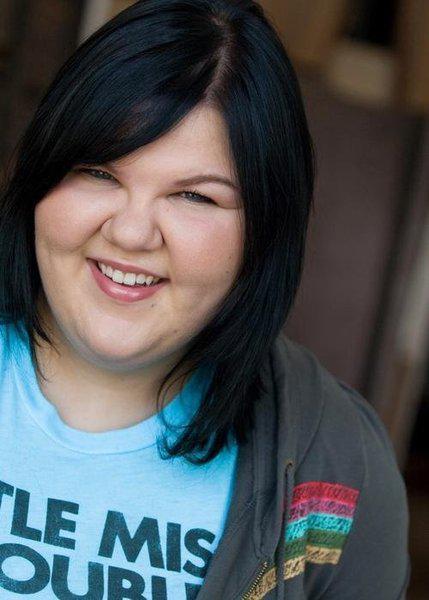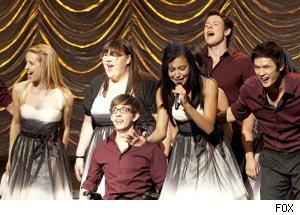
Actress Ashley Fink
Every once in a while, usually when 30 Rock is a re-run, I’ll flip over to the CW. And I kind of get the draw of the utterly escapist fantasies that shows like 90210 and Gossip Girl offer. Serena Van Der Woodsen / Blake Lively is like 14 feet tall with blonde hair that cascades over her shoulders as she effortlessly hails a cab on her way to a club – that just so happens to blithely serve the underage – in order to sabatoge another rich, white, tall, thin, personality-less girl in a plan that always seems to involve drugs or faked pregnancies or a trip to Geneva or something that probably could’ve been solved had she invited her nemesis to have a nice talk over Chai tea. But what do I know.
And for so long, this was all teens had. We turned on the TV and we were inundated with gorgeous creatures living our escapist fantasies. Were any of us represented in these shows? Did any of us recognize ourselves or our real problems in these shows? Unless there are more teens inexplicably blowing their trust funds on jaunts across Europe randomly in the middle of the school year than I thought, then the answer would be no. We ate it up because we wanted to be those characters, sure, but also because we didn’t have very many other options.
Then Glee came along.
At first, we thought Glee was just a show that glorified the inexplicable burst into a musical number in the middle of the school hall. Which is cool – I secretly have a dream that some 80’s hit will magically be broadcasted over my school’s PA system and that the entire student body will spontaneously break out into a perfectly choreographed dance, so I appreciated the show from the get go. But then they started to get real. They had a mission to spread the gospel of diversity, and they were not giving up.
There is absolutely no doubt that Glee has the widest range of characters of any show on the air right now – and they actually reflect real teens (WHAT A CONCEPT!). From race to ability to sexual orientation, Glee put it all out there. While we’d arguably been introduced to all of these character “types” before, they’d always been “special” episodes. You know – the whole “this is the episode where the main character meets a handicapable student and realizes it’s great to be different” – then the show goes back to “normal.” Glee introduced these characters as actual members of the cast, with well-rounded personalities and problems and everything! And my peers took it in stride – it was beautiful! Look, my generation gets diversity and we want to accept people! Progress!
Then they introduced the character of Lauren, played by actress Ashley Fink, an overweight, female wrestler, who joins Glee club as a “warm body” so that they have enough participants to compete.
And that’s when my peers began to lose their shit. It’s not just that this Lauren chick was fat – that was heresy enough. As I overheard somebody in my grade saying, “who wants to watch that on TV.” It’s that she was okay with being fat. You guys…she called herself beautiful. She’s secure, confident, and a complete badass despite the fact that her physical appearance does not meet societal standards. And not just societal standards, which are impossible enough to meet, but she’s nowhere near the standard for a female TV CHARACTER. I MEAN FOR GOD’S SAKE THAT IS NOT OKAY. And if that wasn’t hard enough to take, the gorgeous singing football player, Puck, fell in love with her. TOO. MUCH. TO. COMPUTE.
This is where I get really, really annoyed.

Lauren performing with the Glee Club
No girl wants to keep comparing herself to the Serena Van Der Woodsons of teen-oreinted T.V. That is the very kind of image that is driving us crazy. I personally know that despite the fact that my entire body is equal to the length of Serena’s impossibly long legs, I still wish I could be as tall as her, and it drives me insane. We really do want to see other representations of women. We want to see a full figured woman, or hell, just an average sized woman would be progress. Because when those images are in the media, it becomes okay. We can breathe a little bit – she’s on T.V. and she looks a little closer to my size, we think, maybe I don’t have to obsess over the fact that my thighs rub together, when her’s may not be 6 inches apart.
But, as Glee’s Lauren has indicated, that want for the representation of “real” women is apparently still on a less than conscious level for teens. Girls reject representations of women like Lauren not because they don’t want to see them, but because we’ve virtually never seen them before. I feel confident stating that we’ve never seen a female character either as large as Lauren, and the larger characters we have seen are constantly crying about their size or being teased, or something. It’s okay to be fat, the media tells us, as long as you’re trying to do something about it, as long as you want to “fix” it and try to achieve that image of perfection. When we see women like Lauren, the sad truth is that we don’t even know what to do with them, despite the fact that we desperately want, and arguably NEED to see them.
And what about when girls like Lauren get the guy like Puck? Well then we have to deal with the reasons WHY we idolize unattainable bodies in most TV shows, and why we use the escapism of replacing ourselves with perfect TV stars to be that girl and be in that relationship. Our whole relationship with hating our body gets called into question. Well she’s big, we start to realize, and she’s okay with it. And she’s with the “ideal” guy. Wait…why do I hate my body again? And then not having that reason why we must, must, must be skinny anymore becomes very unsettling. We’re left somewhere between still hating our bodies (those years of damage can’t be erased with one character on Glee) and getting a glimpse that it might actually be okay to not be…well, perfect.
What do we do with that?
Well, we hate Lauren.
Some might see this Lauren-hate phenomenon as an indication that girls reject images of larger women in the media, that we’re not ready for it or don’t want it. On the contrary, this reaction is evidence that we need more images of Lauren-like characters. Girls really, truly look to the media – especially T.V. – as a guide of sorts, and this backlash to Lauren only illuminates the sad truth that we don’t even know what a real woman looks like when she appears on our T.V. screen – even if we might be living with or best friends with somebody who looks exactly like her.
For the record, not all of us hate Lauren. A lot of us get that she’s awesome and that her character is super progressive. I personally LOVE her and think she’s the most empowered female character I’ve ever seen on T.V. And the more we see Lauren-esque characters, the more we will ALL learn to be okay with the way we look. We will learn that it’s’ not only a reality that our bodies are not going to look like Blake Lively’s, but that it’s possible to like, even love, ourselves for this very reason.

